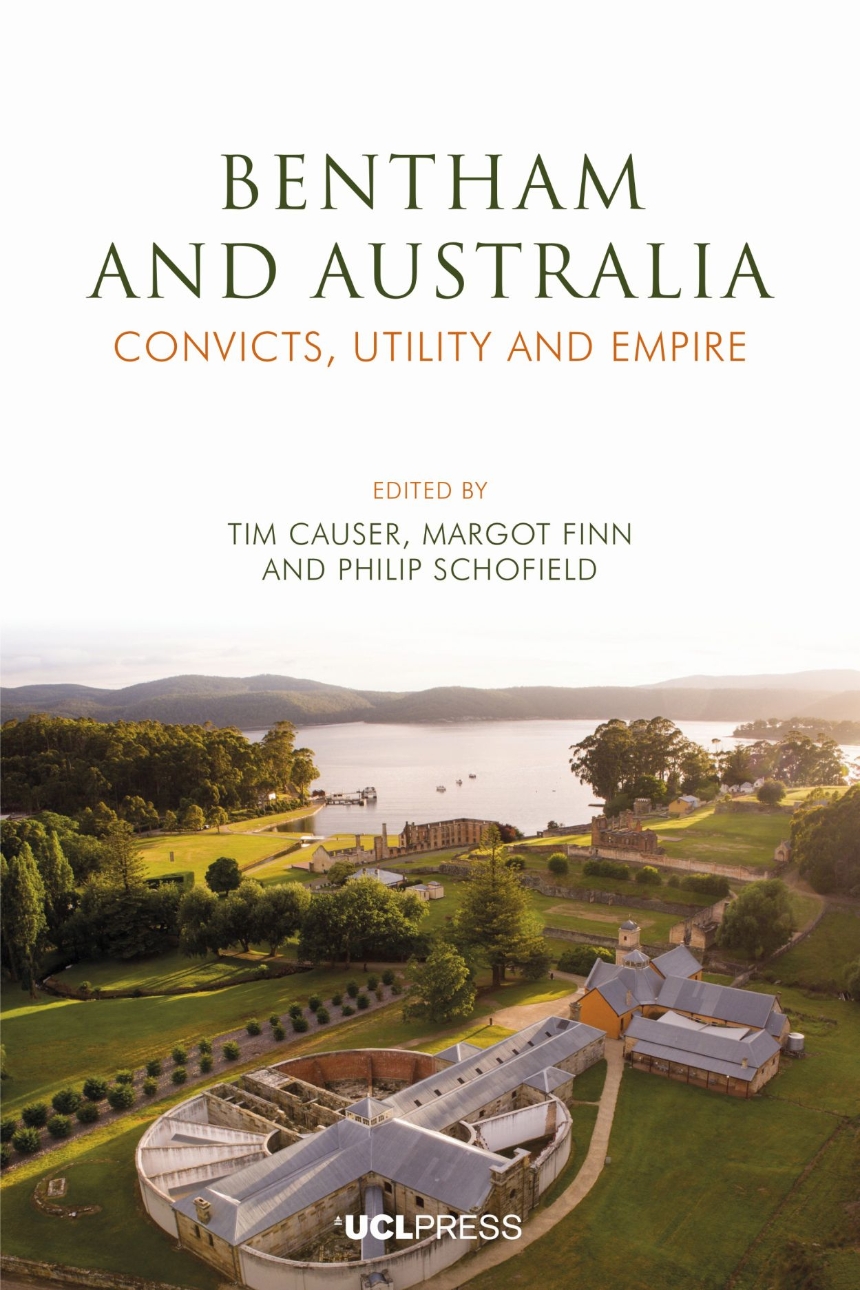Distinguished scholars contextualize and critically assess Jeremy Bentham’s writings on Australia.
This volume considers Jeremy Bentham’s Australian writings. In the first part of the volume, Bentham’s works are placed in their historical contexts, while the second part provides a critical assessment of the historical accuracy and plausibility of Bentham’s arguments against transportation from the British Isles. In the third part, attention turns to Bentham’s claim that New South Wales was founded illegally and to the imperial and colonial constitutional ramifications of that claim. The authors also discuss Bentham’s work of 1831 in which he supports the establishment of a free colony on the southern coast of Australia. In the final part, the authors shed light on the history of Bentham’s panopticon penitentiary scheme, his views on the punishment and reform of criminals and what role, if any, religion had to play in that regard, and discuss apparently panopticon-inspired institutions built in the Australian colonies.
This collection will appeal to readers interested in Bentham’s life and thought, the history of transportation from the British Isles and of British penal policy more generally, colonial and imperial history, Indigenous history, legal and constitutional history, and religious history.
This volume considers Jeremy Bentham’s Australian writings. In the first part of the volume, Bentham’s works are placed in their historical contexts, while the second part provides a critical assessment of the historical accuracy and plausibility of Bentham’s arguments against transportation from the British Isles. In the third part, attention turns to Bentham’s claim that New South Wales was founded illegally and to the imperial and colonial constitutional ramifications of that claim. The authors also discuss Bentham’s work of 1831 in which he supports the establishment of a free colony on the southern coast of Australia. In the final part, the authors shed light on the history of Bentham’s panopticon penitentiary scheme, his views on the punishment and reform of criminals and what role, if any, religion had to play in that regard, and discuss apparently panopticon-inspired institutions built in the Australian colonies.
This collection will appeal to readers interested in Bentham’s life and thought, the history of transportation from the British Isles and of British penal policy more generally, colonial and imperial history, Indigenous history, legal and constitutional history, and religious history.
420 pages | 16 color plates | 6.14 x 9.21 | © 2022
Asian Studies: Southeast Asia and Australia
History: History of Ideas
Philosophy: History and Classic Works
Table of Contents
List of contributors
List of figures
List of tables
Acknowledgements
Introduction
Tim Causer
Part I. The historical context of Bentham’s writings on
Australia
1. Bentham and the Criminal-Fiscal state
Deborah
Oxley
2. Bentham, convict
transportation, and the Great Confinement Thesis
Hamish
Maxwell-Stewart
Part II. Bentham and the theory and practice of transportation to
Australia
3. ‘Confinement’, ‘banishment’, and ‘bondage’: contesting practices of
exile in the British Empire
Kirsten McKenzie
4. Would Western Australia have met Bentham’s five measures of penal justice?
Katherine Roscoe and Barry Godfrey
5. ‘Inspection, the only effective instrument of reformative management’: Bentham, surveillance, and convict recidivism in early New South Wales
Matthew Allen and David Andrew Roberts
Part III. The constitutional implications of Bentham’s writings on Australia
6. Jeremy Bentham and the imperial constitution at the Meridian, 1763–1815: legislature, judicature, and office in the Administration of England and the British Empire
Edward Cavanagh
7. ‘The British Constitution Conquered in New South Wales’: Bentham and constitutional reform in early Australia, 1803–24
Anne Brunon-Ernst
8. Jeremy Bentham on South Australia, colonial government, and representative democracy
Philip Schofield
9. ‘Peopling the Country by Unpeopling It’: Jeremy Bentham’s silences on Indigenous Australia
Zoë Laidlaw
Part IV. Bentham, the panopticon penitentiary scheme, and penal institutions and practices in Australia and Britain
10. Inverting the panopticon: Van Diemen’s Land and the invention of a colonial Pentonville Prison
Honey Dower
11. The panopticon archetype and the Swan River Colony: establishing Fremantle Gaol, 1831–41
Emily Lanman
12. Religion and penal reform in the Australian writings of Jeremy Bentham
Hilary M. Carey
13. The panopticon penitentiary, the convict hulks, and political corruption: Jeremy Bentham’s ‘Third Letter to Lord Pelham’
Tim Causer
Index
List of figures
List of tables
Acknowledgements
Introduction
Tim Causer
Part I. The historical context of Bentham’s writings on
Australia
1. Bentham and the Criminal-Fiscal state
Deborah
Oxley
2. Bentham, convict
transportation, and the Great Confinement Thesis
Hamish
Maxwell-Stewart
Part II. Bentham and the theory and practice of transportation to
Australia
3. ‘Confinement’, ‘banishment’, and ‘bondage’: contesting practices of
exile in the British Empire
Kirsten McKenzie
4. Would Western Australia have met Bentham’s five measures of penal justice?
Katherine Roscoe and Barry Godfrey
5. ‘Inspection, the only effective instrument of reformative management’: Bentham, surveillance, and convict recidivism in early New South Wales
Matthew Allen and David Andrew Roberts
Part III. The constitutional implications of Bentham’s writings on Australia
6. Jeremy Bentham and the imperial constitution at the Meridian, 1763–1815: legislature, judicature, and office in the Administration of England and the British Empire
Edward Cavanagh
7. ‘The British Constitution Conquered in New South Wales’: Bentham and constitutional reform in early Australia, 1803–24
Anne Brunon-Ernst
8. Jeremy Bentham on South Australia, colonial government, and representative democracy
Philip Schofield
9. ‘Peopling the Country by Unpeopling It’: Jeremy Bentham’s silences on Indigenous Australia
Zoë Laidlaw
Part IV. Bentham, the panopticon penitentiary scheme, and penal institutions and practices in Australia and Britain
10. Inverting the panopticon: Van Diemen’s Land and the invention of a colonial Pentonville Prison
Honey Dower
11. The panopticon archetype and the Swan River Colony: establishing Fremantle Gaol, 1831–41
Emily Lanman
12. Religion and penal reform in the Australian writings of Jeremy Bentham
Hilary M. Carey
13. The panopticon penitentiary, the convict hulks, and political corruption: Jeremy Bentham’s ‘Third Letter to Lord Pelham’
Tim Causer
Index

